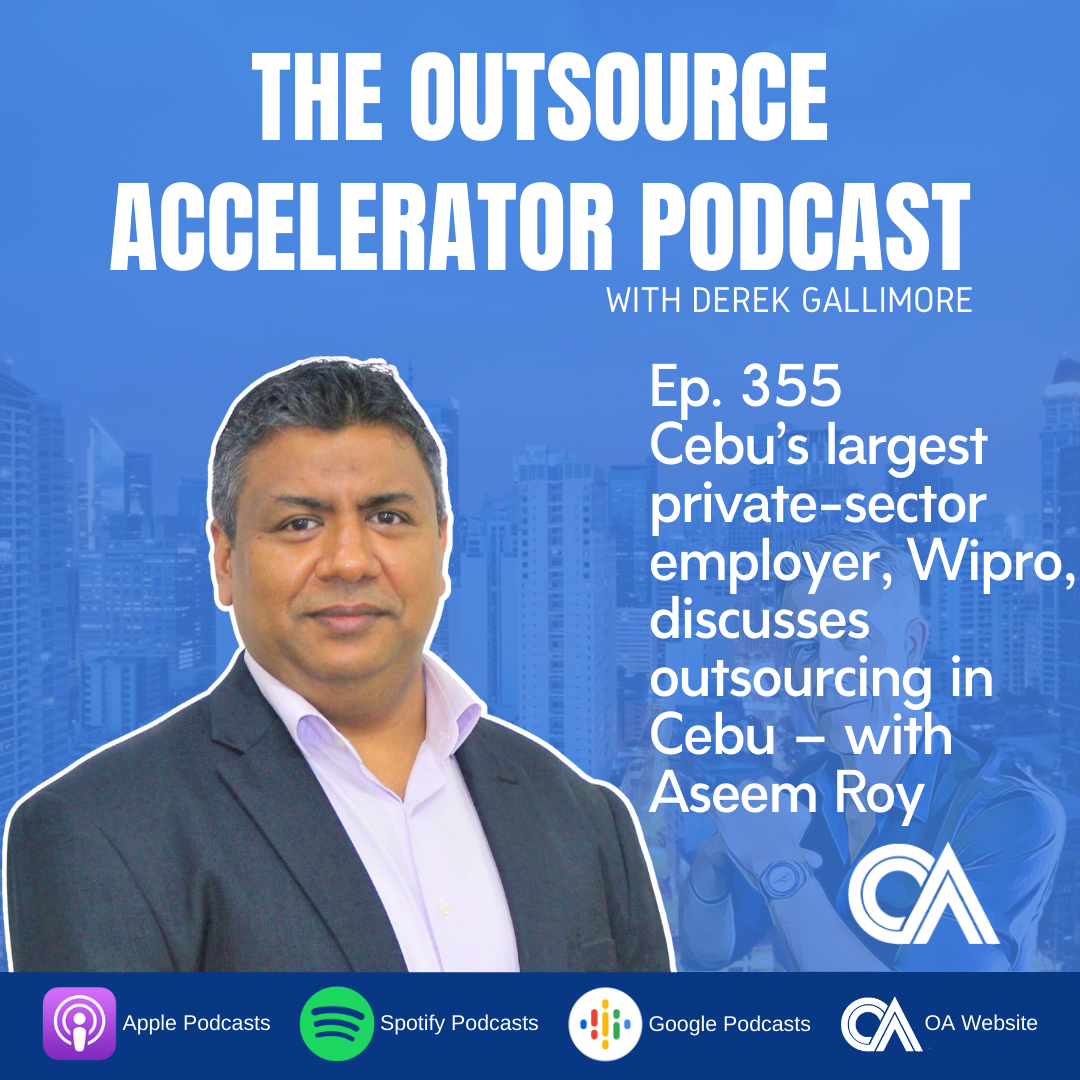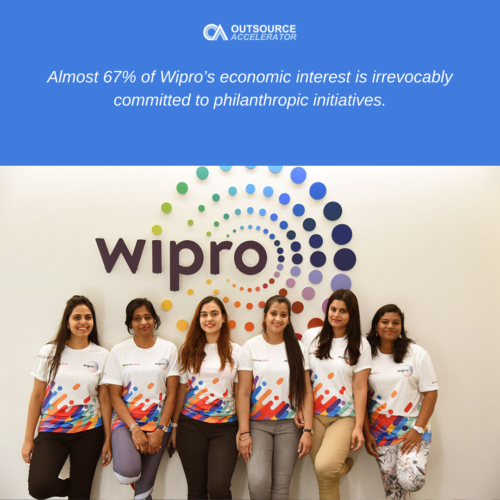Cebu’s largest private-sector employer, Wipro, discusses outsourcing in Cebu – with Aseem Roy

Wipro
Derek Gallimore talks with Aseem Roy, Head of International Operations and Country Head Philippines of Wipro. Wipro is one of the leading and most established BPO companies that offer IT-related and business process services to global companies.
Aseem is also a trustee of the Cebu IT-BPM Organization (Cib.O), an institution helping to establish and develop the BPO industry in Cebu.
Both Wipro and the Philippine BPO industry have undergone decades of establishment as some of the leading outsourcing companies and destinations globally. In this episode, Aseem and Derek will explore and discuss Wipro as an established company and Cebu as an outsourcing destination.
Aseem Roy’s outsourcing journey
Aseem Roy is the current Head of International Operations and Country Head Philippines of Wipro, a BPO organization headquartered in India. He is also a Trustee of Cebu IT-BPM Organization (Cib.O).
Aseem started his outsourcing journey when he joined Spectramind in 2001. The company was then acquired by Wipro the following year.
Over the years, he managed to work through the ranks, from managing accounts to handling some of Wipro’s domestic businesses.
Aseem came to the Philippines in 2010 and has been in the country for 11 years now.
How Wipro established its brand
The leading global IT, consulting, and business process company traces its roots back in 1945.
Wipro once made its name as a consumer product company named Western India Vegetable Products. Back then, they centered in manufacturing vegetable-based products such as soap and oil.
It was in 1982 when the company ventured into IT production then diversified into more IT services in the ‘90s. Upon getting listed in the New York Stock Exchange in 2000, they decided to expand their offering with a customer service arm, leading to the acquisition of Spectramind.
Wipro’s acquisition phase continued in 2015, a year after launching Wipro Digital. Over the years, they established what is now a globally-recognized brand known for their comprehensive services, commitment to sustainability, and good corporate citizenship.
Within the past year, per Aseem, Wipro has undergone a complete revamp in the management structure, making them “stronger, more rejuvenated” than before.
Wipro on its purpose and commitment
Aseem highlighted the company’s focus on their “purpose”.
According to him, 67% of Wipro’s economic interest lies in philanthropic efforts through the Azim Premji Foundation, named after the company’s founder, Azim Premji.
Premji, along with the directors, decided to have shareholders value a crucial part of their business ethics while ensuring to “take care of the communities around [Wipro].”
A part of this strategy includes being a founding member of Transform to Net Zero, an initiative aiming to accelerate the transition to a “net zero emissions” global economy by 2050. As Aseem stated, this initiative will be “good for people, businesses, and our planet”.
India vs the Philippines as outsourcing powerhouses
Per Aseem, global economies looking at the BPO industry does not make “too much of segregation” country-wise. Rather, they look at the IT-BPO setup at a larger scale.
This even applies in terms of Indian and the Philippine BPO industries. BPOs in the Philippines are 90% business processes and 10% IT-focused services. In India, meanwhile, 90% lies on IT services while 10% on BPO.
The Philippines even have more distinctions, with its strong cultural affinity, knowledge in English, and timezone and sociopolitical alignment. With these advantages, the country has done “exceptionally well” with being the BPO capital of the world.
One thing Aseem observed in the country’s BPO industry lies in its resilience in several areas.
- The threat of automation. Outsourcing companies recognize the rise of automation and its purpose in eradicating “mundane, repetitive work”. With this, service providers focus more on upskilling and talent development to help them stay competitive.
- Disruptions due to the pandemic. The industry responded well during the COVID pandemic. Despite the lockdowns and the crisis, they have added around 30,000 jobs in the past year alone, supporting around 1.3 million people directly.
In a greater outlook, as Aseem observed, the two outsourcing countries might have a competition. Yet, each has “created a niche for themselves”.
Cebu’s outsourcing landscape
Wipro still does strategic business and IT work in Manila. However, the quality of service, resilience, and equally great talent pool, infrastructure, and traffic moderation made Cebu a stable business continuity plan (BCP) location.
Per Aseem, Cebu does not have as many disruptions as those faced in Manila, such as heavy traffic, earthquakes, and typhoons. It has even shown its resilience during the pandemic.
All of this is done with the help of its communities and industry bodies such as Cib.O and IT and Business Process Association of the Philippines (IBPAP).
Cib.O in its contribution to the Cebu outsourcing industry
Cib.O has been “the backbone of the outsourcing industry in Cebu” for almost 20 years now.
The organization is bound to help its new and existing members in establishing their outsourcing companies and connecting them to both private and public institutions.
Currently, they are working on their “Strat 8 Plans” or the eight strategies in managing challenges and taking opportunities brought by the pandemic. One of which includes promoting the interest of the IT-BPO sector in Cebu.
Aside from this, one of Cib-O.s initiatives is in line with “looking at opportunities outside Cebu city in terms of promoting employment”. With this, they provide help in streamlining their strategies, advisory on their preferred location, and finding the right talent to scale up opportunities.
As Aseem implied, Cib.O is “much like a family setup”. This is since they team up and bring “insights that [companies] will never find in a published journal or news report.”

Aseem on the future of outsourcing in the Philippines
Prior to the pandemic, the BPO industry in the Philippines boomed from 2010 to 2016, with an annual growth rate of around 14% to 16%. IBPAP still managed to expect its growth to around 9% up to 2022 despite the threat of disruptions.
The pandemic helped show the industry’s “well adapting to change” for a hybrid model. Yet, it also showed that companies “not investing enough in new digital platforms” were the ones that struggled the most.
With this, Aseem implied that all businesses across sectors “have to adapt to the new norm”, which will be more likely hybrid.
Despite preferring to work from the office when the pandemic gets under control, investing on platforms and systems and making the company “future-proof” will be a key differentiator for businesses in the future.
Upskilling the FIlipino workforce
The Philippines has seen its cities slip out of the Top 100 cities for outsourcing services in the past three years. This is since the demand shifted to bringing more value to their clients
With this, the industry and the academia have teamed up to create “massive outreach [for] different certification and courses available on New Age technologies.” This, as Aseem explains, gives “a larger breadth and understanding of technologies behind some of [popular] innovations” including AI.
Aseem suggests that companies should “be better trained, prepared, certified, [have] better understanding of [its] market, and then adapt [their] talent pool to stay on base.”
This can be a wake up call for BPOs and their clients alike that “what worked in the past may not work now,” especially in the new normal.
To learn more bout Cib.O and Wipro, check out their websites at https://www.cib.org.ph/ and
Listen to more podcast episodes here:
- The agility of a 10,000-employee outsourcing specialist – CSS Corp with Arvind Appavu
- Remarkable outsourcing journey with Aaron Fischer of Office Partners 360 (OP360)
- The Transformative Power of Outsourcing with Brad Stevens of Outsource Access
- A pioneer of SME outsourcing with Microsourcing’s Charles Allnutt








 Independent
Independent




